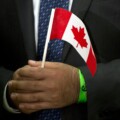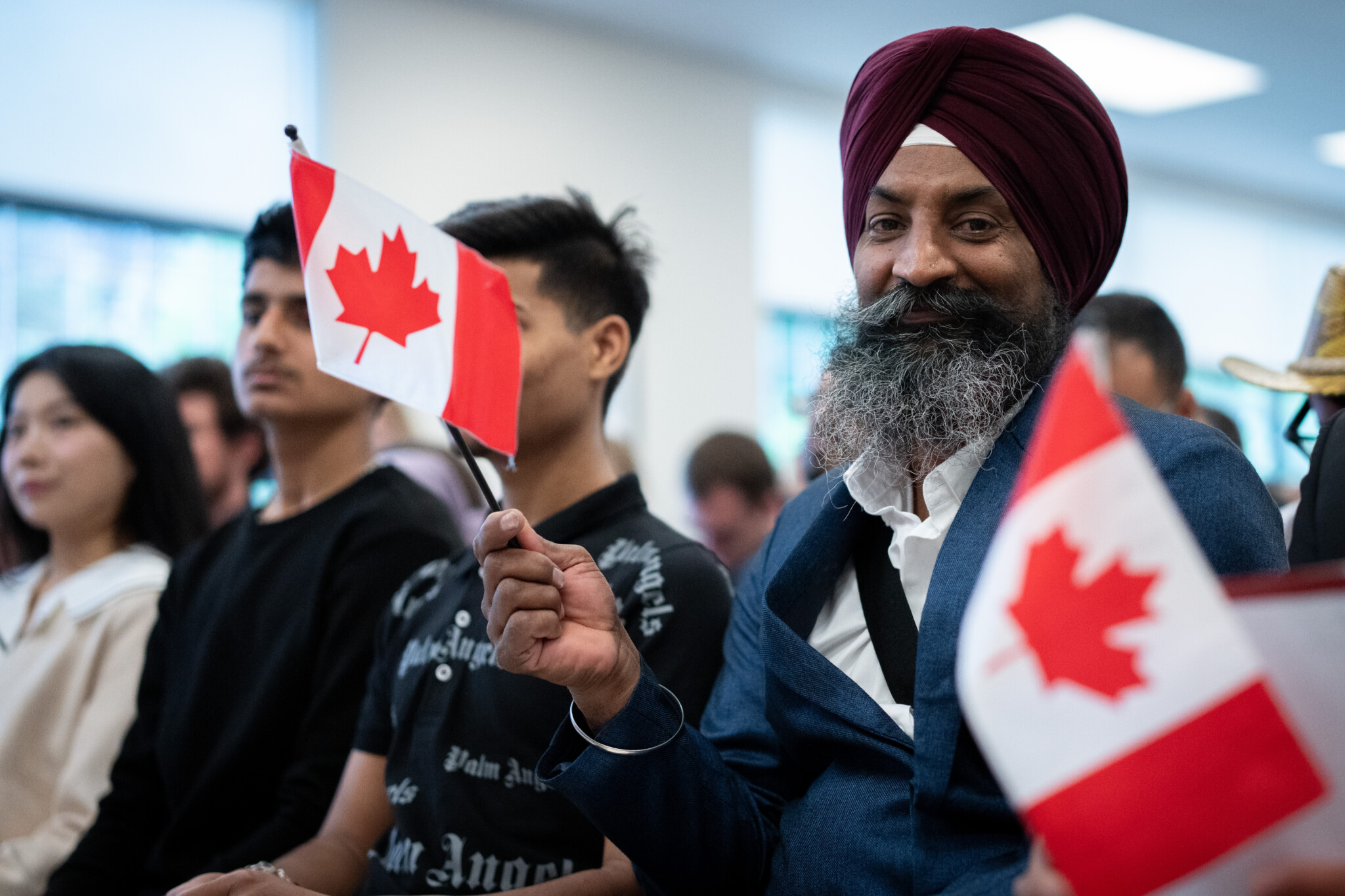Conventional wisdom on Canadian immigration policy has been shifting so quickly in recent years it can be hard to keep up. Here’s my best attempt at a succinct summary of the narratives that have defined the topic since the mid-2000s or so.
Stephen Harper
During the conservative prime ministership of Stephen Harper (2006-2015), annual immigration rates rose gradually but consistently. His first full year in office welcomed 236,758 new permanent residents; by his last year, that number had risen to 271,845. This had the effect of increasing Canada’s foreign-born population from 20 percent to 22 percent during his tenure.
These numbers both helped nullify immigration as a point of partisan polarization in Canadian elections—given the two main parties shared a common pro-immigration position—and earned the Conservative Party unusual praise from progressives for being less demagogic on the matter than right-wing parties elsewhere in the world. This culminated in a popular cliche during the Harper years that the prime minister’s pro-immigration stance was itself partially responsible for keeping him in power; that his enlightened position on the issue was being rewarded with newfound votes from grateful immigrant communities. Harper himself believed this to be true, but I’ve never seen much hard evidence proving it.
Since conservatives are stereotyped as being good economic stewards, and the Canadian economy performed well relative to peer countries during his rule, another popular bit of Harper-era immigration lore was that his Conservative government had come to understand immigration as a critical component of the country’s economic success. That is, the party was not just pro-immigration for gauzy, sentimental reasons, but flint-eyed, self-interested, capitalistic ones too.
It’s important to note that Harper’s immigration policies were never all that popular with the public. When asked to describe their ideal immigration agenda, polls consistently showed a majority favoring capping or decreasing the overall intake, which was of course the opposite of what Harper did. But it’s also true that the issue was low salience for most voters. Immigration did not poll high as a subject of concern during election campaigns, and since it wasn’t actively debated, feelings were rarely inflamed. It’s likewise worth noting that for all the praise Harper enjoyed as a savvy immigration proponent, the increases he presided over were mostly status quo; immigration to Canada had been rising steadily under prime ministers of both parties following a spike in the mid-1980s.
Justin Trudeau
In my opinion, all of this created a somewhat disingenuous elite narrative that there existed a broad “consensus” around immigration in Canadian society; that Canada’s immigration policies were largely uncontroversial, well-thought-out, economically rational, and indeed, a model for the world. When Justin Trudeau beat Harper in 2015 the “consensus” narrative consolidated further and featured prominently in the flattering stories about Canada-as-liberal-oasis that were briefly in vogue following Donald Trump’s election. Amid “wall-builders, door-slammers and drawbridge-raisers, Canada stands out as a heartening exception,” said The Economist in 2016.
These days, however, Trudeau is no longer popular to like or be seen as liking.
Conservatives are loath to admit this, but the Canadian press is often less liberally biased than just prone to gradually falling out of love with whoever’s in power, and Trudeau—now badly trailing in the polls—is today routinely subject to the same sort of late-regime scorn that Harper was near the end of his. One manifestation has been increasingly hostile columns accusing the prime minister of “breaking Canada’s immigration consensus” with an immigration intake that has gotten so high and so thoughtless it’s become an active provocation to the public.
Examples:
“Ottawa’s inaction is fraying the consensus on immigration”— Globe and Mail editorial board, Jan. 13, 2024
“Anxiety over the housing shortfall threatens the Canadian consensus on immigration”— Aaron Wherry, CBC Jan. 13, 2024
“Canada’s unique, decades-old, pro-immigration consensus has been broken.”— Tony Keller, Globe and Mail, Jan. 19, 2024
“For decades, there was solid political and social consensus on immigration in Canada. But recently, cracks in that consensus have emerged.”— Althia Raj, Toronto Star, Feb. 9, 2024
“…with housing and health-care shortages causing pain from coast to coast, it was never a good idea to take Canada’s pro-immigration consensus for granted.”— Sabrina Maddeaux, National Post, Jul. 8, 2023
The arguments contained in pieces like these posit that the Trudeau-era hikes to immigration, which have risen from 296,346 new permanent residents in 2016 to 437,539 in 2022 (a nearly 50 percent increase in contrast to Harper’s modest 15 percent) have put enormous strain on endless aspects of Canadian society, including housing, transportation, health care, education, and of course employment. A growing population raises demand for just about everything—less than ideal in a country where a high cost of living has become the defining anxiety.
Second-guessing the economic costs/benefits of immigration has likewise led to increased focus on the kinds of immigrants that Canada is welcoming, which were never quite as “carefully selected” as popular legend held (the fact that Canadian “economic” class immigrants include dependents, for instance, has made it one of Canada’s most persistently deceptive statistics). Skepticism is now openly directed towards the hundreds of thousands of non-permanent foreign students entering Canada every year and the additional hundred thousand or so who come on “temporary foreign worker” visas (a subject of controversy during the Harper years as well). Trudeau has recently pledged to cut both categories—an unprecedented act in the “consensus” era, and evidence of the defensiveness he’s feeling on a file prime ministers are not usually accused of mishandling.
It’s relevant that the negative consequences of immigration that the press now accuses Trudeau of exacerbating mostly centre around the practical concerns that come with growing a mid-sized nation’s population at such a rapid clip (437,539 immigrants in one year is the equivalent of adding “an entire Halifax of newcomers” observed the National Post’s Tristin Hopper). The critique is rarely cultural, except to the extent Canadians are warned that undermining the pro-immigration consensus could increase support for crass, Trump-style politicians.As usual, Quebec exists in a dimension all its own. Crass Trump-style, or even Tucker Carlson-style, politicians thundering about immigration representing an existential threat to the Volkskörper are entirely mainstream there.
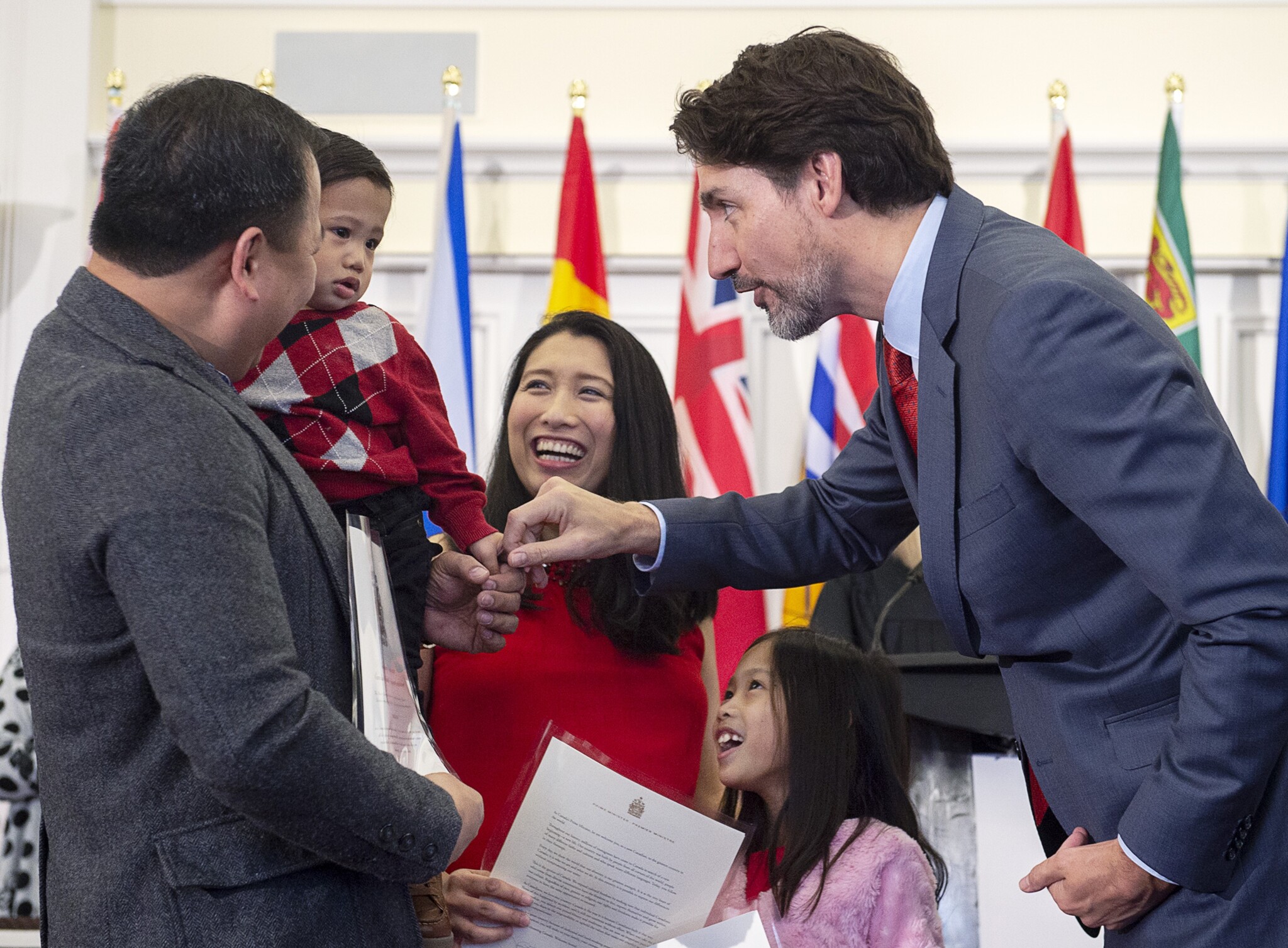
Prime Minister Justin Trudeau chats with a family of new Canadians as he attends a citizenship ceremony at Acadia University in Wolfville, N.S. on Tuesday, March 3, 2020. Andrew Vaughan/The Canadian Press.
Pierre Poilievre
All this puts the Conservatives under Pierre Poilievre in an interesting position. The Canadian press, and thinky class more generally, has created a permission structure for him to run for prime minister on a platform of reducing immigration without fear of being characterized as a racist fearmonger. Polls suggest over 60 percent of Canadians both want and expect him to do this. Yet Poilievre himself has so far avoided articulating the extent to which he agrees; at his tightly scripted rallies he has no standard immigration-related applause line.
It’s possible his party is still captive to the legends of the Harper years—that they believe immigrant voters are “their” constituency to lose, and Conservatives must therefore tread lightly on rhetoric that could be seen as anti-immigrant. Despite a clearly changing tone in media coverage, the party might also simply not trust the press to accurately characterize a restrictionist Conservative immigration plan, and thus feel there’s no PR incentive to spend much time talking about the issue when they’re already enjoying such a solid lead in the polls.
Or, and perhaps most likely, Poilievre simply wants a restrictionist immigration agenda to be something he can roll out at a more politically opportune time—closer to the official fall 2025 election campaign when Canadians will be paying the most attention, and will be most aware of his promises.
Yesterday’s political taboo could be tomorrow’s ace in the hole.
This column originally appeared at J.J. McCullough’s Shortstack.
Recommended for You
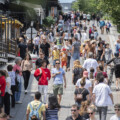
Sabrina Maddeaux: Canada’s immigration absolutists are refusing to correct course, no matter the cost
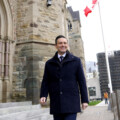
The Weekly Wrap: Pierre Poilievre leans in on immigration
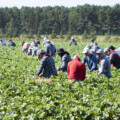
Alexander Brown: The latest population numbers are slightly down—but Canadian workers should still be worried
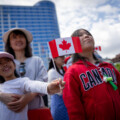
Theo Argitis: Canada’s great immigration experiment is ending
